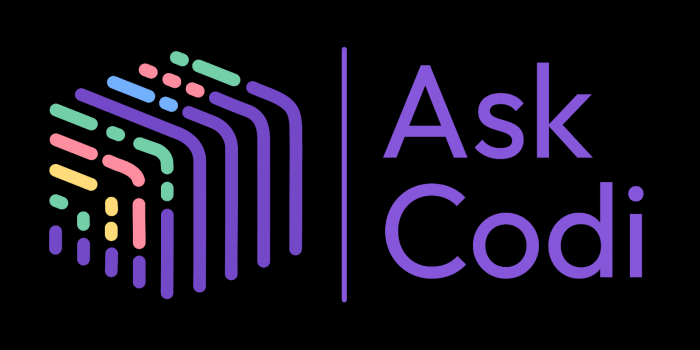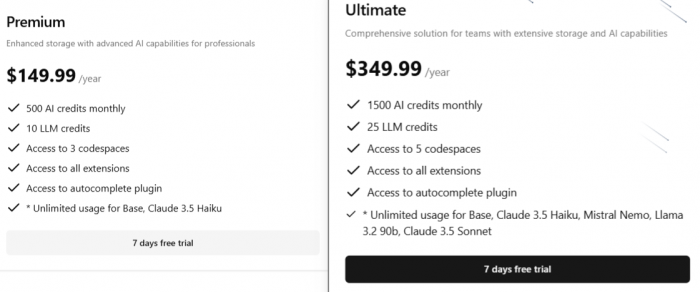Pricing alone doesn’t explain much about a tool like AskCodi. You can read that it costs $149.99 or $349.99 per year, but what does that translate to in practice? After spending time with the platform, I realized the real question is less about “how much does it cost” and more about “how far do those credits go?”

This article breaks down AskCodi’s pricing in simple terms and reflects on what it feels like to work within those limits, without trying to sell or dismiss the platform.
The Basics: What AskCodi Charges For
AskCodi follows a credit-based annual subscription model, with two plans:
- Premium Plan – $149.99/year
- Ultimate Plan – $349.99/year
There’s no monthly payment option, and no permanent free tier. Everyone starts with a 7-day free trial, which is unrestricted. What you're paying for isn’t storage or users — it’s AI usage.
You receive monthly credits:
- AI Credits: Used when you run tasks like writing tests, generating Dockerfiles, or summarizing files.
- LLM Credits: Used when you choose to use large external models (GPT-4, Claude, Gemini, etc.).
These credits reset monthly and do not roll over.
Credits Overview
Every time you ask AskCodi to do something — write a test, refactor code, generate a CI pipeline, it consumes AI credits. If you ask it to use a specific model like GPT-4 or Claude Sonnet, it consumes LLM credits as well.
Some tools consume more credits than others. For example:
- Writing five small SQL queries may barely touch your quota.
- Generating a full suite of unit tests from a legacy repo can eat up 20–30 credits fast.
- Switching models and iterating on the same file with different AI engines can use up LLM credits quicker than expected.
There’s no hard number published per task, which means you notice the system more through usage than documentation.
Plan Comparison (Summarized)
| Feature | Premium Plan ($149.99) | Ultimate Plan ($349.99) |
| AI Credits per Month | 500 | 1500 |
| LLM Credits per Month | 10 | 25 |
| Active Codespaces | 3 | 5 |
| Free Trial | 7 days | 7 days |
| Monthly Billing | Not available | Not available |
Using AskCodi daily: Credit Awareness Becomes a Habit
After a few sessions, I started thinking in terms of “credit cost.” I’d ask myself:
- Do I need to re-run that prompt on GPT-4, or can I switch to Claude?
- Should I use the test writer again, or just write two of them manually?
In that sense, AskCodi encourages precision. It’s not unlimited — and it’s not pretending to be. It’s more like a pool of assistance you have to manage wisely over a month.

What AskCodi Doesn’t Charge For
- You’re not charged per project.
- There are no extra fees for using integrations (like VS Code or JetBrains).
- You can switch between LLMs as long as you have credits.
- Access to tools like the Sandbox, Schema Resolver, or Documentation Generator is included in both plans.
However, there’s no overflow option or extra usage add-on; once you use up your monthly allowance, you wait until it resets.

What the Pricing Doesn’t Tell You (But You’ll Notice)
- No Pay-As-You-Go: If you’re a light user, the annual commitment may feel disproportionate.
- No Team Mode: Pricing is built around individual use — no shared credits or workspaces.
- No Project Storage or Hosting: AskCodi isn’t a deployment tool, so it’s not priced like Replit or GitHub Codespaces.
- No Granular Credit Tracker: You don’t always know exactly what a task will cost until you see credits drop.
That doesn’t mean it’s a bad value; it just means you need to monitor usage instead of assuming everything is on-demand.
Who Gets the Most Value from AskCodi’s Pricing
The way AskCodi structures its pricing makes the most sense for developers who use AI tools as part of their regular workflow, not just occasionally.
Suitable for:
- Developers who work solo and need task-specific automation (e.g., writing tests, generating Dockerfiles, refactoring legacy code).
- Freelancers or contractors handling multiple client projects, where switching between tech stacks is common.
- Users who want to experiment with different LLMs (e.g., GPT-4 for logic, Claude for summaries) without locking into a single AI provider.
May not be ideal for:
- Casual users who only need occasional code help — the annual cost may outweigh actual usage.
- Teams or collaborators, AskCodi currently offers no shared workspaces or pooled credits.
- Users looking for a monthly billing option or smaller entry point — there’s no tier below Premium, and no option to pay per use.
Final Thoughts
AskCodi doesn’t price itself like an assistant that you talk to occasionally. It positions itself as a functional utility that becomes part of your workflow. That structure has benefits, predictable access, no ads, focused tools, but also boundaries.
If you’re considering it, the trial period gives you enough time to figure out whether the monthly credit model fits your usage habits. But the price only makes sense if the tool becomes something you reach for regularly, not occasionally.
Post Comment
Be the first to post comment!





